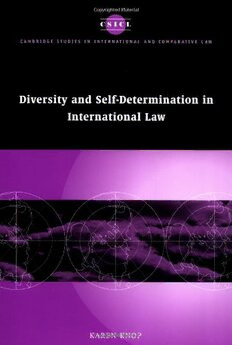
Diversity self determination int law PDF
458 Pages·2002·1.588 MB·English
Most books are stored in the elastic cloud where traffic is expensive. For this reason, we have a limit on daily download.
Preview Diversity self determination int law
Description:
When does international law give a group the right to choose its sovereignty? In an original perspective on this familiar question, Knop analyzes the ways that many of the groups that the right of self-determination most affects--including colonies, ethnic nations, indigenous peoples and women--have been marginalized in its interpretation. Her analysis also reveals that key cases have grappled with this problem of diversity. Challenges by marginalized groups to the culture or gender biases of international law emerge as integral to the cases, as do attempts to meet these challenges.
See more
The list of books you might like
Most books are stored in the elastic cloud where traffic is expensive. For this reason, we have a limit on daily download.
